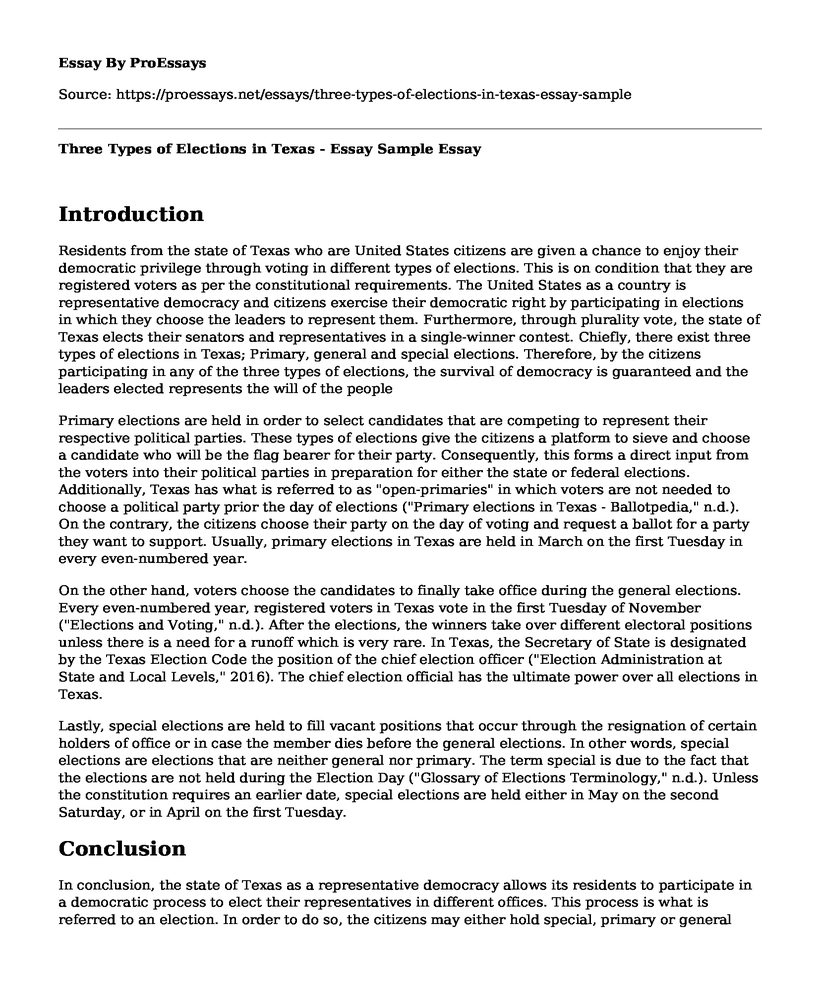Introduction
Residents from the state of Texas who are United States citizens are given a chance to enjoy their democratic privilege through voting in different types of elections. This is on condition that they are registered voters as per the constitutional requirements. The United States as a country is representative democracy and citizens exercise their democratic right by participating in elections in which they choose the leaders to represent them. Furthermore, through plurality vote, the state of Texas elects their senators and representatives in a single-winner contest. Chiefly, there exist three types of elections in Texas; Primary, general and special elections. Therefore, by the citizens participating in any of the three types of elections, the survival of democracy is guaranteed and the leaders elected represents the will of the people
Primary elections are held in order to select candidates that are competing to represent their respective political parties. These types of elections give the citizens a platform to sieve and choose a candidate who will be the flag bearer for their party. Consequently, this forms a direct input from the voters into their political parties in preparation for either the state or federal elections. Additionally, Texas has what is referred to as "open-primaries" in which voters are not needed to choose a political party prior the day of elections ("Primary elections in Texas - Ballotpedia," n.d.). On the contrary, the citizens choose their party on the day of voting and request a ballot for a party they want to support. Usually, primary elections in Texas are held in March on the first Tuesday in every even-numbered year.
On the other hand, voters choose the candidates to finally take office during the general elections. Every even-numbered year, registered voters in Texas vote in the first Tuesday of November ("Elections and Voting," n.d.). After the elections, the winners take over different electoral positions unless there is a need for a runoff which is very rare. In Texas, the Secretary of State is designated by the Texas Election Code the position of the chief election officer ("Election Administration at State and Local Levels," 2016). The chief election official has the ultimate power over all elections in Texas.
Lastly, special elections are held to fill vacant positions that occur through the resignation of certain holders of office or in case the member dies before the general elections. In other words, special elections are elections that are neither general nor primary. The term special is due to the fact that the elections are not held during the Election Day ("Glossary of Elections Terminology," n.d.). Unless the constitution requires an earlier date, special elections are held either in May on the second Saturday, or in April on the first Tuesday.
Conclusion
In conclusion, the state of Texas as a representative democracy allows its residents to participate in a democratic process to elect their representatives in different offices. This process is what is referred to an election. In order to do so, the citizens may either hold special, primary or general elections. While primary elections sieve and choose that nominee representing their parties in general elections, the general elections in November are held to determine those to hold office. In case an office is vacant due to death or resignation, special elections are held to fill the vacant seat.
References
Election Administration at State and Local Levels. (2016, June 15). Retrieved from http://www.ncsl.org/research/elections-and-campaigns/election-administration-at-state-and-local-levels.aspx. Accessed September 24, 2018
Glossary of Elections Terminology. (n.d.). Retrieved from https://www.sos.state.tx.us/elections/laws/glossary.shtml. Accessed September 24, 2018
Primary elections in Texas - Ballotpedia. (n.d.). Retrieved September 24, 2018, from https://ballotpedia.org/Primary_elections_in_Texas
Elections and Voting. (n.d.). Retrieved from http://www.travisbryan.org/resources/faq/elections-and-voting/#faq_5. Accessed September 24, 2018
Cite this page
Three Types of Elections in Texas - Essay Sample. (2022, Aug 15). Retrieved from https://proessays.net/essays/three-types-of-elections-in-texas-essay-sample
If you are the original author of this essay and no longer wish to have it published on the ProEssays website, please click below to request its removal:
- Trump's Acceptance Speech Analysis
- Levitsky and Way vs. Diamond Debate: Democracy in Recession
- Current United States Congress Essay
- Essay Example on Plato's Blueprint for Democracy: Aristocracy for Tyranny Prevention
- Essay Example on NJ County Commission Meeting - 15 June 2020
- Paper Example on Does the DARE Program Work? Evidence and Findings
- Paper Example on Polk County, FL: Decentralized Governance & Self-Governance Through its Charter







